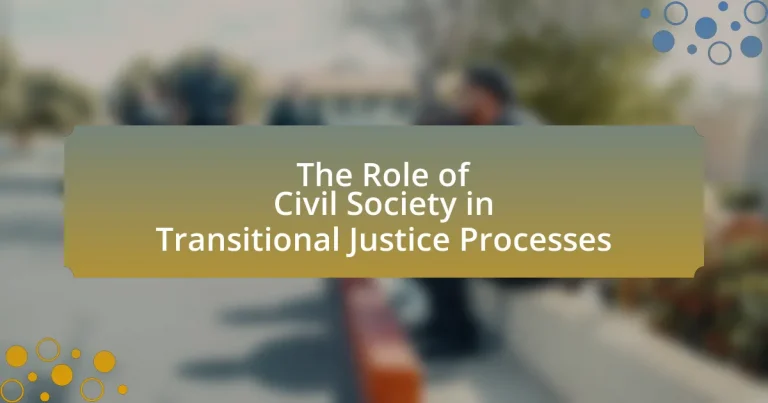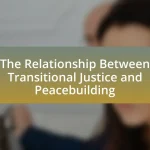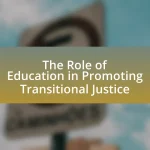Civil society plays a vital role in transitional justice processes by advocating for accountability, promoting human rights, and facilitating dialogue among affected communities. This article examines the specific functions of civil society, including advocacy, monitoring, and community engagement, highlighting its influence on public perception and the effectiveness of justice mechanisms. It also addresses the challenges faced by civil society organizations, such as limited resources and political repression, while outlining strategies to enhance their impact in promoting justice and reconciliation. Through various examples, the article illustrates how civil society contributes to shaping policies, supporting victims, and ensuring transparency within formal justice systems.
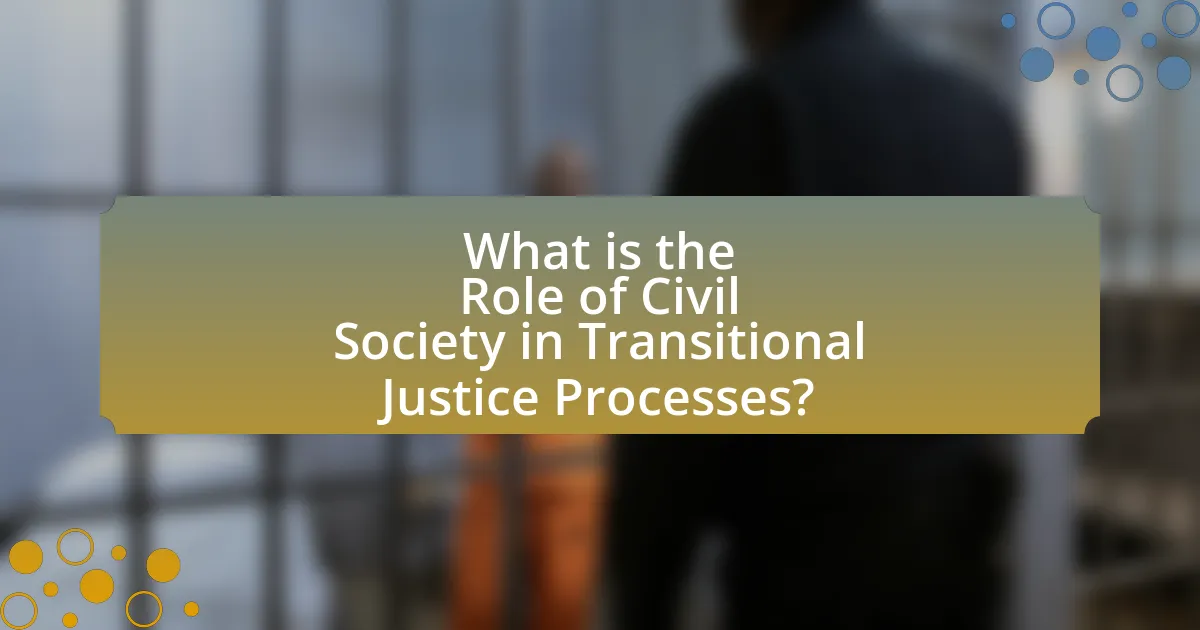
What is the Role of Civil Society in Transitional Justice Processes?
Civil society plays a crucial role in transitional justice processes by advocating for accountability, promoting human rights, and facilitating dialogue among affected communities. Civil society organizations often serve as intermediaries between victims and state institutions, ensuring that the voices of marginalized groups are heard and considered in the justice process. For instance, organizations like the International Center for Transitional Justice have documented the importance of civil society in shaping policies that address past atrocities and support victims’ rights. Furthermore, civil society contributes to the monitoring and evaluation of transitional justice mechanisms, helping to ensure transparency and effectiveness in the implementation of justice initiatives.
How does civil society contribute to transitional justice?
Civil society contributes to transitional justice by advocating for accountability, promoting victims’ rights, and facilitating dialogue among stakeholders. Organizations within civil society often serve as watchdogs, monitoring government actions and ensuring that justice mechanisms are implemented effectively. For instance, in South Africa, civil society played a crucial role during the Truth and Reconciliation Commission by mobilizing public support and providing platforms for victims to share their experiences. This involvement not only helped to document human rights abuses but also fostered a culture of accountability and healing within the society.
What specific functions does civil society serve in these processes?
Civil society serves several specific functions in transitional justice processes, including advocacy, monitoring, and facilitating dialogue. Advocacy by civil society organizations raises awareness about human rights violations and pressures governments to implement justice measures. Monitoring involves tracking the implementation of transitional justice mechanisms, ensuring accountability, and providing independent assessments of progress. Additionally, civil society facilitates dialogue among various stakeholders, including victims, government officials, and the international community, fostering reconciliation and understanding. These functions are crucial for ensuring that transitional justice processes are inclusive, transparent, and effective in addressing past injustices.
How does civil society influence public perception of transitional justice?
Civil society significantly influences public perception of transitional justice by advocating for accountability, promoting awareness, and facilitating dialogue among affected communities. Organizations within civil society, such as NGOs and grassroots movements, often serve as intermediaries between the public and governmental institutions, shaping narratives around justice and reconciliation. For instance, in post-apartheid South Africa, civil society groups played a crucial role in publicizing the Truth and Reconciliation Commission’s findings, which helped to frame the discourse on justice and healing. This engagement not only informed public opinion but also pressured authorities to address historical injustices, demonstrating the power of civil society in shaping perceptions and outcomes in transitional justice processes.
Why is civil society important in transitional justice?
Civil society is important in transitional justice because it acts as a crucial mediator between the state and the affected communities, ensuring that the voices of victims are heard and considered in the justice process. Civil society organizations often provide essential support in documenting human rights abuses, advocating for accountability, and promoting public awareness of transitional justice issues. For instance, organizations like Human Rights Watch and Amnesty International have played significant roles in highlighting injustices and pushing for reforms in various countries undergoing transitions from conflict or authoritarian rule. Their involvement helps to foster transparency, build trust in the justice system, and empower communities to participate actively in the healing and reconciliation processes.
What unique perspectives does civil society bring to transitional justice?
Civil society brings critical perspectives to transitional justice by emphasizing community needs, promoting accountability, and fostering inclusivity. These organizations often represent marginalized voices, ensuring that the experiences of victims are central to the justice process. For instance, civil society groups have been instrumental in advocating for victim reparations and truth commissions, as seen in South Africa’s Truth and Reconciliation Commission, which highlighted the importance of public testimony in healing societal wounds. Furthermore, civil society’s role in monitoring and evaluating transitional justice mechanisms enhances transparency and public trust, as evidenced by their involvement in the International Criminal Court’s proceedings. This engagement not only enriches the transitional justice discourse but also strengthens democratic governance by holding state actors accountable.
How does civil society enhance accountability in transitional justice processes?
Civil society enhances accountability in transitional justice processes by acting as a watchdog, advocating for victims’ rights, and promoting transparency. Organizations within civil society monitor government actions and judicial proceedings, ensuring that perpetrators of human rights violations are held accountable. For instance, groups like Human Rights Watch and Amnesty International document abuses and push for legal reforms, thereby influencing public policy and judicial outcomes. Additionally, civil society facilitates community engagement and dialogue, empowering victims to share their experiences, which fosters a culture of accountability and remembrance. This active participation has been shown to lead to more effective transitional justice mechanisms, as evidenced by case studies in countries like South Africa and Rwanda, where civil society played a crucial role in shaping the truth and reconciliation processes.
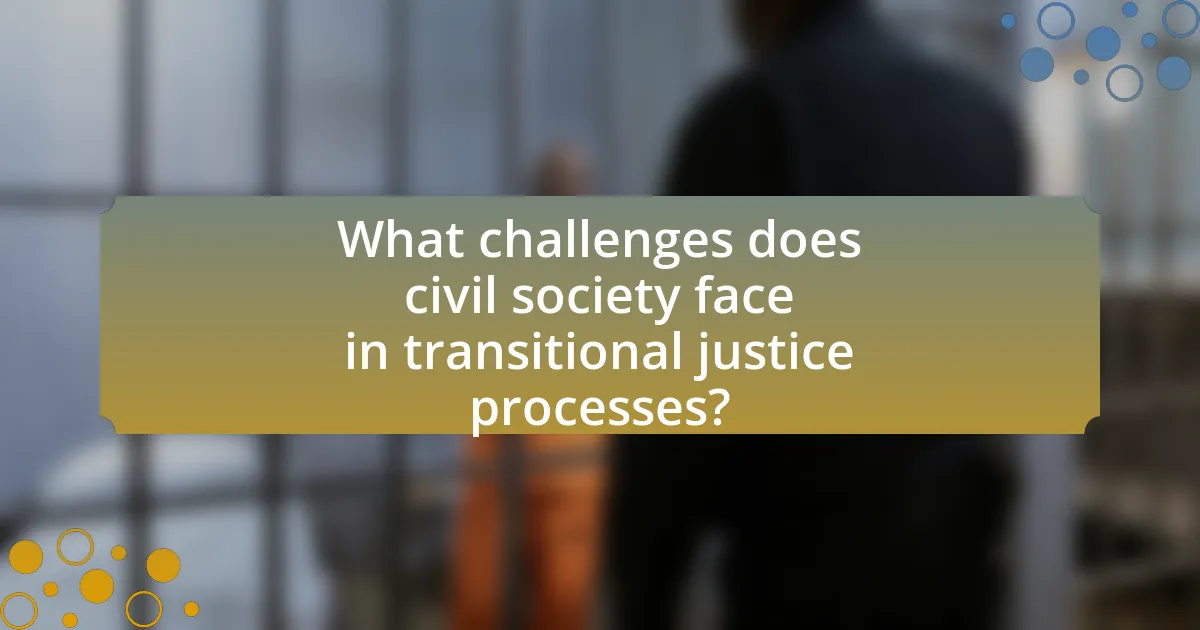
What challenges does civil society face in transitional justice processes?
Civil society faces significant challenges in transitional justice processes, including limited access to decision-making, lack of resources, and threats to safety. These obstacles hinder civil society organizations from effectively advocating for victims’ rights and participating in the justice process. For instance, in countries like Colombia, civil society groups have reported intimidation and violence, which undermines their ability to operate freely and engage with governmental bodies. Additionally, inadequate funding restricts their capacity to conduct research, mobilize communities, and provide necessary support services. These challenges collectively impede the role of civil society in fostering accountability and reconciliation in post-conflict settings.
How do political environments affect civil society’s role?
Political environments significantly influence civil society’s role by determining the level of freedom and resources available for civic engagement. In authoritarian regimes, civil society often faces repression, limiting its ability to advocate for justice and accountability, as seen in countries like Belarus, where government crackdowns stifle dissent. Conversely, in democratic settings, civil society can thrive, promoting transparency and participation in transitional justice processes, as evidenced by South Africa’s Truth and Reconciliation Commission, which relied heavily on civil society organizations to facilitate dialogue and healing. Thus, the political context shapes civil society’s capacity to operate, impacting its effectiveness in transitional justice initiatives.
What are the risks civil society organizations encounter during transitional justice?
Civil society organizations encounter several risks during transitional justice, including threats to their safety, loss of credibility, and challenges in accessing resources. These organizations often face intimidation or violence from state actors or non-state groups opposed to their work, which can jeopardize the safety of their members and undermine their operations. Additionally, civil society organizations may struggle with maintaining credibility if they are perceived as biased or if they fail to engage effectively with all stakeholders, leading to diminished trust from the communities they aim to serve. Furthermore, limited access to funding and resources can hinder their ability to carry out essential activities, impacting the overall effectiveness of transitional justice processes.
How can civil society overcome obstacles in transitional justice contexts?
Civil society can overcome obstacles in transitional justice contexts by fostering inclusive dialogue and building coalitions among diverse stakeholders. This approach enables civil society organizations to amplify marginalized voices, ensuring that the transitional justice process reflects the needs and experiences of all affected communities. For instance, in South Africa, civil society played a crucial role in the Truth and Reconciliation Commission by mobilizing grassroots support and facilitating community engagement, which helped to address historical grievances and promote healing. By leveraging local knowledge and networks, civil society can also advocate for legal reforms and accountability measures, thereby enhancing the legitimacy and effectiveness of transitional justice initiatives.
What strategies can civil society employ to strengthen its role?
Civil society can strengthen its role in transitional justice processes by fostering inclusive dialogue and collaboration among diverse stakeholders. This approach ensures that marginalized voices are heard and integrated into decision-making, which enhances legitimacy and effectiveness. For instance, the International Center for Transitional Justice emphasizes the importance of community engagement in shaping justice mechanisms, as seen in post-conflict societies like South Africa, where civil society organizations played a crucial role in the Truth and Reconciliation Commission. By advocating for transparency and accountability, civil society can also hold governments and institutions accountable, thereby reinforcing public trust and participation in transitional justice initiatives.
How can civil society engage with other stakeholders in transitional justice?
Civil society can engage with other stakeholders in transitional justice by facilitating dialogue, advocating for victims’ rights, and participating in policy formulation. Through organized forums and workshops, civil society organizations can create platforms for discussion among government entities, international organizations, and affected communities, ensuring that diverse perspectives are included in the transitional justice process. For instance, the International Center for Transitional Justice highlights that civil society plays a crucial role in monitoring the implementation of justice mechanisms, thereby holding stakeholders accountable and ensuring transparency. This engagement not only empowers victims but also fosters a collaborative environment essential for effective transitional justice.
What best practices can civil society adopt to enhance its effectiveness?
Civil society can enhance its effectiveness by fostering collaboration among diverse stakeholders, including government entities, international organizations, and local communities. This collaborative approach allows for the pooling of resources, knowledge sharing, and the establishment of a unified agenda, which is crucial in transitional justice processes. For instance, the International Center for Transitional Justice emphasizes that inclusive dialogue among various actors leads to more comprehensive and sustainable justice outcomes. Additionally, civil society should prioritize capacity building through training and education, enabling organizations to better advocate for victims’ rights and engage in policy-making. Research by the United Nations Development Programme indicates that well-trained civil society organizations are more effective in influencing legal reforms and public policy. By adopting these best practices, civil society can significantly improve its impact in transitional justice initiatives.
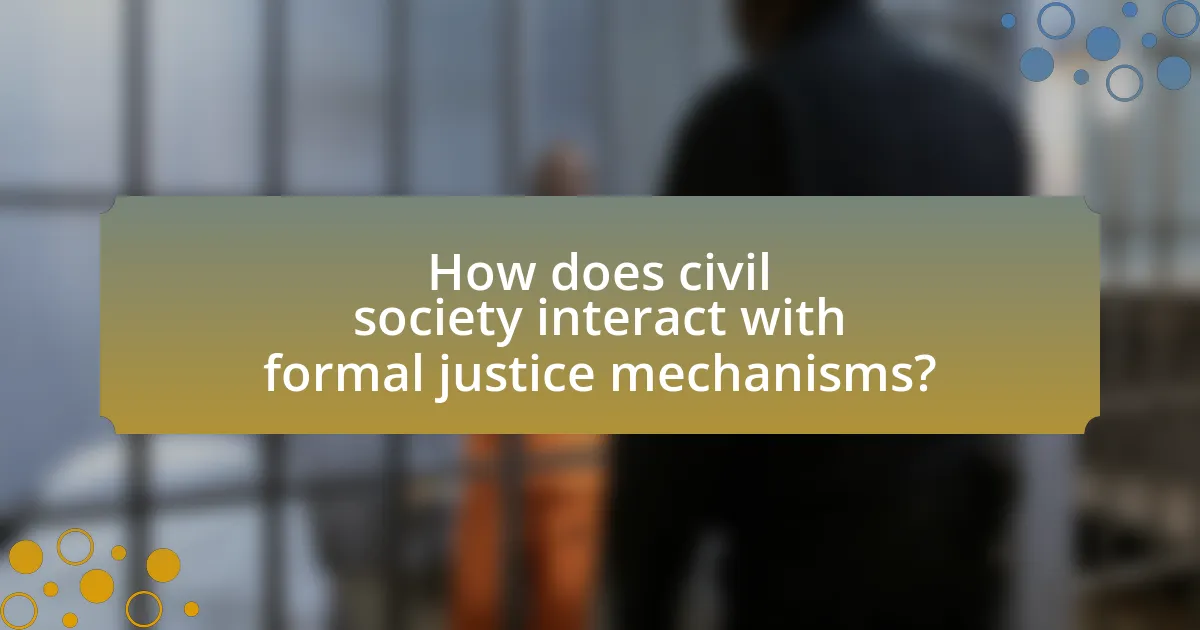
How does civil society interact with formal justice mechanisms?
Civil society interacts with formal justice mechanisms by advocating for accountability, providing support to victims, and facilitating dialogue between communities and state institutions. Civil society organizations often monitor judicial processes, ensuring transparency and fairness, which enhances public trust in the justice system. For instance, organizations like Human Rights Watch and Amnesty International document human rights abuses and push for legal reforms, thereby influencing policy changes. Additionally, civil society plays a crucial role in raising awareness about legal rights and mobilizing communities to engage with formal justice systems, as seen in various transitional justice contexts where grassroots movements have successfully lobbied for the establishment of truth commissions and reparations programs.
What is the relationship between civil society and judicial institutions?
Civil society plays a crucial role in shaping and influencing judicial institutions, particularly in transitional justice processes. Civil society organizations advocate for accountability, transparency, and the protection of human rights, which are essential for the legitimacy and effectiveness of judicial systems. For instance, during transitional periods, civil society often mobilizes public opinion and provides legal assistance, thereby facilitating access to justice for victims of past abuses. Research indicates that countries with active civil society engagement in judicial reform tend to experience more robust and fair legal systems, as evidenced by the work of organizations like the International Center for Transitional Justice, which highlights the positive impact of civil society on judicial accountability and reform efforts.
How can civil society support victims within formal justice systems?
Civil society can support victims within formal justice systems by providing legal assistance, advocacy, and psychological support. Organizations such as legal aid clinics and victim support groups help victims navigate complex legal processes, ensuring they understand their rights and options. For instance, studies show that legal representation significantly increases the likelihood of favorable outcomes for victims in court. Additionally, civil society can advocate for policy reforms that enhance victim rights and protections, as seen in various transitional justice frameworks where civil society has successfully influenced legislation. Furthermore, psychological support services offered by civil society organizations help victims cope with trauma, which is crucial for their participation in justice processes.
What role does civil society play in monitoring judicial processes?
Civil society plays a crucial role in monitoring judicial processes by ensuring transparency, accountability, and adherence to the rule of law. Organizations within civil society, such as non-governmental organizations and advocacy groups, actively observe court proceedings, document judicial conduct, and report on any irregularities or abuses. For instance, in countries transitioning from authoritarian regimes, civil society organizations have been instrumental in advocating for fair trials and monitoring the implementation of judicial reforms, thereby contributing to the establishment of a more just legal system. Their involvement often leads to increased public awareness and pressure on judicial authorities to uphold legal standards, as evidenced by the work of groups like Human Rights Watch and Amnesty International, which have documented judicial processes in various countries to highlight issues of injustice and promote reform.
How can civil society advocate for policy changes in transitional justice?
Civil society can advocate for policy changes in transitional justice by mobilizing grassroots support, engaging in dialogue with policymakers, and utilizing legal frameworks to influence reforms. Grassroots movements can raise awareness about injustices and build public pressure for change, as seen in countries like South Africa, where civil society played a crucial role in the Truth and Reconciliation Commission. Engaging in dialogue with policymakers allows civil society organizations to present evidence-based recommendations, ensuring that the voices of victims are included in the policy-making process. Additionally, leveraging legal frameworks, such as international human rights laws, can provide a basis for advocating for accountability and reparations, as demonstrated by the work of organizations like Amnesty International and Human Rights Watch in various transitional justice contexts.
What methods can civil society use to influence policy decisions?
Civil society can influence policy decisions through advocacy, public campaigns, and participation in policy-making processes. Advocacy involves mobilizing citizens and stakeholders to raise awareness about specific issues, thereby pressuring policymakers to consider their demands. Public campaigns, such as protests or social media initiatives, can amplify voices and draw attention to injustices, leading to increased public support for policy changes. Additionally, civil society organizations often engage directly with policymakers by providing expert testimony, participating in consultations, and collaborating on policy development, which can shape the outcomes of legislative processes. For instance, the involvement of civil society in the Truth and Reconciliation Commission in South Africa significantly impacted the country’s transitional justice policies, demonstrating the effectiveness of these methods in influencing policy decisions.
How can civil society mobilize communities for transitional justice advocacy?
Civil society can mobilize communities for transitional justice advocacy by fostering awareness, building coalitions, and facilitating dialogue. By organizing educational campaigns, civil society organizations can inform communities about their rights and the importance of transitional justice, which has been shown to enhance public engagement and support for justice initiatives. For instance, in post-apartheid South Africa, organizations like the Truth and Reconciliation Commission utilized community workshops to educate citizens on the process, leading to increased participation in hearings and testimonies. Additionally, civil society can create coalitions among various stakeholders, including victims, activists, and local leaders, to unify efforts and amplify voices advocating for justice. This collective action has proven effective in countries like Colombia, where grassroots movements have successfully influenced policy changes related to transitional justice. Lastly, facilitating open dialogue within communities allows for the sharing of personal experiences and collective grievances, which can strengthen community bonds and motivate collective action towards justice.
What practical steps can civil society take to enhance its impact in transitional justice?
Civil society can enhance its impact in transitional justice by actively engaging in advocacy, monitoring, and education. Advocacy efforts can include lobbying for legal reforms that support victims’ rights and promote accountability for perpetrators of human rights violations. Monitoring involves documenting abuses and ensuring that transitional justice mechanisms are implemented effectively, as seen in the work of organizations like Human Rights Watch, which has reported on the effectiveness of truth commissions in various countries. Education initiatives can raise awareness about transitional justice processes and empower communities to participate, as demonstrated by programs that inform citizens about their rights and the importance of justice in post-conflict societies. These steps collectively strengthen the role of civil society in shaping transitional justice outcomes.
